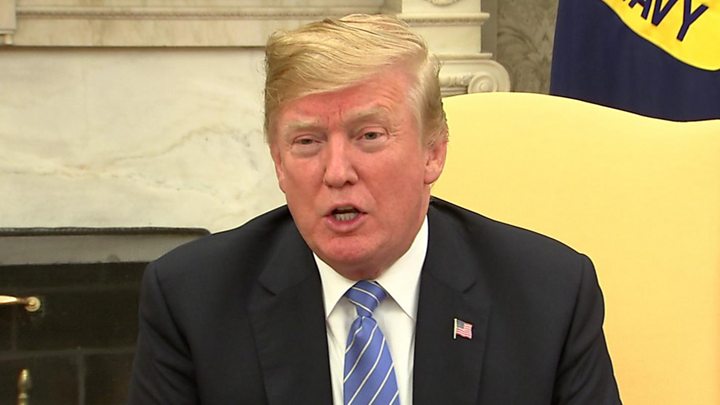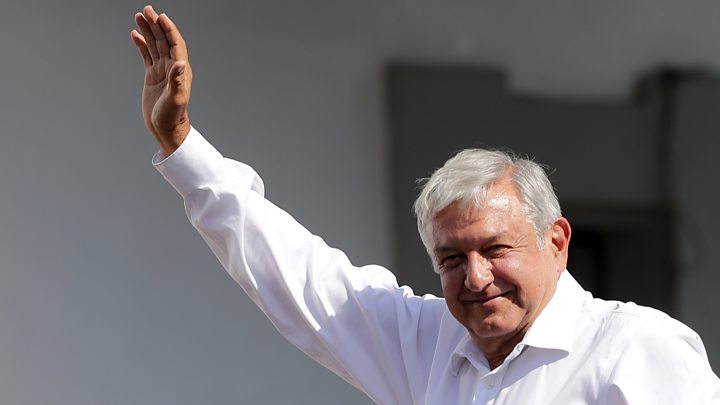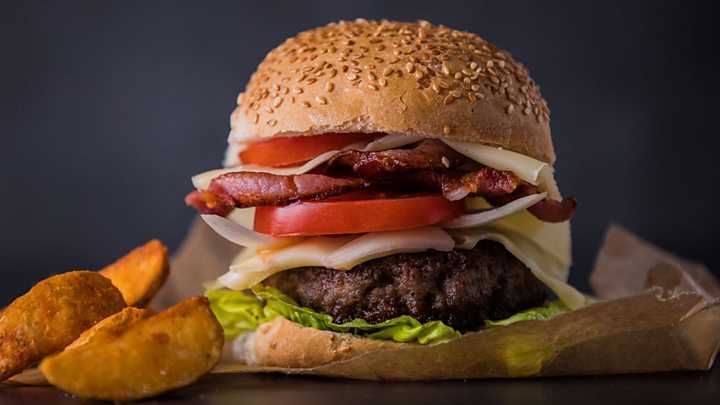Media playback is unsupported on your device
Mexico's President-elect, Andrés Manuel López Obrador, and US President Donald Trump have spoken on the phone after the left-wing candidate won Mexico's presidential election on Sunday.
The president-elect said that he and the US leader had discussed a potential deal on development.
Mr Trump said earlier that he looked forward to working with Mr López Obrador.
Trade and migration disputes have strained US relations with Mexico.
In a tweet on Monday, Mr López Obrador, 64, said that he had spoken with Mr Trump for half an hour, adding: "I proposed exploring a comprehensive agreement on development projects which will create jobs in Mexico, and with it, reduce migration and improve security."
He highlighted the "respectful" nature of the conversation, having previously pledged to build a relationship of "mutual respect" with the US.
The BBC's Will Grant says that the message is very much in keeping with Mr López Obrador's focus on providing ordinary Mexicans with decent jobs, something he repeated often during the campaign.
Mr Trump said the two leaders had spoken about the potential for a separate trade deal between their countries.

Media playback is unsupported on your device
Official projections give Mr López Obrador more than 53% of the vote following Sunday's election, although it is unclear whether his party will secure an outright majority in parliament.
He has said will make tackling corruption his top priority.
He inflicted a crushing defeat on the candidates of the two big established parties, Ricardo Anaya of the National Action Party (PAN) and José Antonio Meade of the Institutional Revolutionary Party (PRI), with independent Jaime Rodríguez Calderón trailing in fourth place.
Under Mexico's constitution, Sunday's winner will not actually be sworn in as president until 1 December.
A night they won't forget
By Will Grant, BBC News, Mexico City
It was a night his supporters will remember for the rest of their lives. They descended in their thousands to Mexico City's main square, the Zocalo, to celebrate that after 12 years of frustration, finally their man will be president.
Perhaps the wait was worth it. Given the exhaustion with the widespread corruption, violence and impunity in Mexico, not only did Mr López Obrador win by a huge margin, expected to be more than 30%, his new coalition, Morena, destroyed the governing conservative PRI party at a local and state level too.
So much so, in fact, that the PRI will now be one of the smaller parties in Congress. Congratulations were sent by international leaders from Nicolás Maduro in Venezuela to President Trump.
Certainly they will have a lot to talk about, with everything from the border wall to the North American Free Trade Agreement a potential source of friction. Still, for now, those jubilant supporters will just be savouring the victory.
What did he say about corruption?
"We are absolutely convinced that this evil is the main cause of social and economic inequality, and also that corruption is to blame for the violence in our country," Mr López Obrador said in a speech to supporters.
No-one involved in corruption will be spared, he said, not even "brothers-in-arms".

Media playback is unsupported on your device
He repeated his campaign pledge to review energy contracts for signs of corruption.
Mexico is perceived as one of the most corrupt countries in the world, according to Transparency International, which ranked it 135 out of 180 states last year, with 180 being the most corrupt.
Corruption scandals damaged the standing of the PRI during the campaign.
What are his other main policies?
According to Reuters news agency, Mr Lopez Obrador said he would be respectful of the current Mexican government team reviewing the North American Free Trade Agreement (Nafta).
The Trump administration wants to renegotiate the 1994 agreement with Mexico and Canada, which created one of the world's largest free trade zones.

Media playback is unsupported on your device
During the campaign Mr López Obrador often used confrontational language when referring to Mr Trump but struck a more conciliatory note in his victory speech, saying he would seek "friendly relations".
On combating Mexico's record levels of violence, much of it related to drug cartels, Mr López Obrador said he would have daily meetings with his security cabinet.
He also tried to reassure the business sector, saying there would be no nationalisation, private business would be respected and taxes would not be raised.
On social policies, he promised to double pensions for the elderly as a first step to reducing the country's disparate income levels.
Some opponents have expressed fears that his leftist and populist policies could damage the already sluggish economy.
Who is López Obrador?
- Born to a family of shopkeepers on 13 November 1953 in the rural community of Tepetitán, in southern Tabasco state
- Known popularly as Amlo, which is an acronym using the full initials of his name
- Elected Mexico City mayor in 2000
- After losing the presidential elections in 2006 and 2012, he ran again this time under a three-party coalition led by the leftist National Regeneration Movement party (Morena) he founded in 2014
- The self-styled anti-establishment figure has now ended the dominance of the PRI and PAN parties he called the "mafia of power"
Media playback is unsupported on your device
Mexico's President-elect, Andrés Manuel López Obrador, and US President Donald Trump have spoken on the phone after the left-wing candidate won Mexico's presidential election on Sunday.
The president-elect said that he and the US leader had discussed a potential deal on development.
Mr Trump said earlier that he looked forward to working with Mr López Obrador.
Trade and migration disputes have strained US relations with Mexico.
In a tweet on Monday, Mr López Obrador, 64, said that he had spoken with Mr Trump for half an hour, adding: "I proposed exploring a comprehensive agreement on development projects which will create jobs in Mexico, and with it, reduce migration and improve security."
He highlighted the "respectful" nature of the conversation, having previously pledged to build a relationship of "mutual respect" with the US.
The BBC's Will Grant says that the message is very much in keeping with Mr López Obrador's focus on providing ordinary Mexicans with decent jobs, something he repeated often during the campaign.
Mr Trump said the two leaders had spoken about the potential for a separate trade deal between their countries.

Media playback is unsupported on your device
Official projections give Mr López Obrador more than 53% of the vote following Sunday's election, although it is unclear whether his party will secure an outright majority in parliament.
He has said will make tackling corruption his top priority.
He inflicted a crushing defeat on the candidates of the two big established parties, Ricardo Anaya of the National Action Party (PAN) and José Antonio Meade of the Institutional Revolutionary Party (PRI), with independent Jaime Rodríguez Calderón trailing in fourth place.
Under Mexico's constitution, Sunday's winner will not actually be sworn in as president until 1 December.
A night they won't forget
By Will Grant, BBC News, Mexico City
It was a night his supporters will remember for the rest of their lives. They descended in their thousands to Mexico City's main square, the Zocalo, to celebrate that after 12 years of frustration, finally their man will be president.
Perhaps the wait was worth it. Given the exhaustion with the widespread corruption, violence and impunity in Mexico, not only did Mr López Obrador win by a huge margin, expected to be more than 30%, his new coalition, Morena, destroyed the governing conservative PRI party at a local and state level too.
So much so, in fact, that the PRI will now be one of the smaller parties in Congress. Congratulations were sent by international leaders from Nicolás Maduro in Venezuela to President Trump.
Certainly they will have a lot to talk about, with everything from the border wall to the North American Free Trade Agreement a potential source of friction. Still, for now, those jubilant supporters will just be savouring the victory.
What did he say about corruption?
"We are absolutely convinced that this evil is the main cause of social and economic inequality, and also that corruption is to blame for the violence in our country," Mr López Obrador said in a speech to supporters.
No-one involved in corruption will be spared, he said, not even "brothers-in-arms".

Media playback is unsupported on your device
He repeated his campaign pledge to review energy contracts for signs of corruption.
Mexico is perceived as one of the most corrupt countries in the world, according to Transparency International, which ranked it 135 out of 180 states last year, with 180 being the most corrupt.
Corruption scandals damaged the standing of the PRI during the campaign.
What are his other main policies?
According to Reuters news agency, Mr Lopez Obrador said he would be respectful of the current Mexican government team reviewing the North American Free Trade Agreement (Nafta).
The Trump administration wants to renegotiate the 1994 agreement with Mexico and Canada, which created one of the world's largest free trade zones.

Media playback is unsupported on your device
During the campaign Mr López Obrador often used confrontational language when referring to Mr Trump but struck a more conciliatory note in his victory speech, saying he would seek "friendly relations".
On combating Mexico's record levels of violence, much of it related to drug cartels, Mr López Obrador said he would have daily meetings with his security cabinet.
He also tried to reassure the business sector, saying there would be no nationalisation, private business would be respected and taxes would not be raised.
On social policies, he promised to double pensions for the elderly as a first step to reducing the country's disparate income levels.
Some opponents have expressed fears that his leftist and populist policies could damage the already sluggish economy.
Who is López Obrador?
- Born to a family of shopkeepers on 13 November 1953 in the rural community of Tepetitán, in southern Tabasco state
- Known popularly as Amlo, which is an acronym using the full initials of his name
- Elected Mexico City mayor in 2000
- After losing the presidential elections in 2006 and 2012, he ran again this time under a three-party coalition led by the leftist National Regeneration Movement party (Morena) he founded in 2014
- The self-styled anti-establishment figure has now ended the dominance of the PRI and PAN parties he called the "mafia of power"











